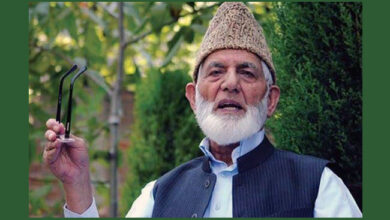Remembering the Cause of Kashmir on the 75th Anniversary of UDHR

Written by: Farhan Ahmed
On International Human Rights Day, when in 1948, the United Nations General Assembly adopted the United Nations Declaration of Human Rights (UDHR), we are faced with a complex humanitarian crisis in Kashmir region. This region having a long history of political and armed conflicts, stands as one of the most pressing issues in the South Asian region. It demands attention from the global powers and the international community. United Nations has presented its various resolution in this regard but they have not been called into effect until now. The reasons for that are rooted in rivalry between Pakistan and India. However, to remember the cause for the Kashmiri people’s liberation is much needed on 10th December, which is the International Human Rights Day.
The inception of the Kashmir conflict dates back to the chaotic partition of the sub-continent by the British India in 1947. This has started the conflict between Pakistan and Indian that still persists till now. The princely state of Jammu and Kashmir still remains a point of contention between the two nuclear powers. The majority population of the region expressed their wish to join hands with the state of Pakistan. However, the Maharaja who felt the need to have military assistance, joined hands with India. Since then, many efforts have been made internationally and bilaterally in history, however, no fruitful outcomes have been reached.
In an effort to bring an end to this conflict, the United Nations has been working since 1945. It passed various resolutions during the early years of the conflict. These resolutions made it crystal clear that the people of Kashmir have the right to decide the ultimate fate of their region. These resolutions are widespread and known even by common people, however, they are still unimplemented. This leaves the people of Kashmir open to occupation and forced control by the authoritarian governments like those of India.
The human rights situation in Kashmir is deeply concerning, with both state and non-state actors involved in severe violations. Extrajudicial executions, enforced disappearances, mass rapes, killings and limits on freedom of expression and media have all been widely reported. The presence of Indian armed forces has frequently been accused of using excessive force, resulting in civilian fatalities and extensive suffering to the innocent people of Kashmir.
With its historical ties to the Kashmiri people, Pakistan has consistently advocated for their rights on various international platforms for many years. The call for justice and peace in Kashmir is a moral imperative deeply rooted in shared history and human compassion and is not just a political stance for Pakistan. The international community must acknowledge the legitimate grievances of the Kashmiri people fully and put pressure on India to engage in genuine dialogue to find a just and lasting solution to this conflict. Otherwise, it will be the cause of destabilization of South Asian region.
On this International Human Rights Day, the global community must recognize its shared responsibility to address the human rights crisis in Kashmir. The United Nations, in particular, needs to revisit the resolutions and actively engage in facilitating a plebiscite that allows the people of Kashmir to decide their own destiny.
On this International Human Rights Day, the world must recognize its collective responsibility to address the human rights issue in Kashmir. The UN, in particular, needs to revisit the resolutions and actively participate in bringing about a plebiscite that puts the people of Kashmir in a position to decide their own fate.
Let us not forget the resilient people of Kashmir, who are still suffering the consequences of a protracted conflict, as we observe International Human Rights Day. It is time for the international community to listen to Pakistan’s case for justice and peace, and band together to put pressure on India to respect human rights of the Kashmiri people, implement UN resolutions, and engage in genuine dialogue for the well-being and choices of the people of Kashmir. The pursuit of justice in Kashmir is a shared global responsibility, not just a regional one.
The writer is a student of Peace and Conflict Studies at National Defense University, Islamabad and is currently serving as an intern at Kashmir Institute of International Relations.





